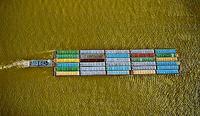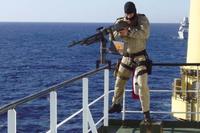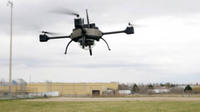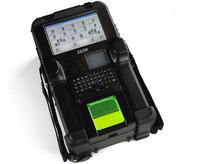-
Barge traffic resumes on Mississippi River

On a typical day, some 600 barges move back and forth along the Mississippi, with a single vessel carrying as much cargo as 70 tractor-trailers or 17 rail cars; the barges haul coal, timber, iron, steel, and more than half of America’s grain exports; interruptions of barge traffic could thus cost the U.S. economy hundreds of millions of dollars for each day the barges are idled; early Tuesday the Coast Guard halted barge and cargo haulers traffic along a 15-mile stretch of the river near Natchez, Mississippi; the Coast Guard and the Army Corps of Engineers were worried that the heavy wake churned by barges and cargo haulers increase the pressure on levees which are already straining to hold back the rising river; on Tuesday night the Coast Guard re-opened the blocked section, and barges were allowed to go through but only one at a time, and at a very low speed
-
-
Drug violence causing U.S. firms to reconsider Mexican investments

As the Mexican government’s battle against drug cartels rages on, U.S. businesses and their employees have become increasingly caught up in the crossfire, which has led many to reconsider investing in Mexico; a recent survey of U.S. companies by the U.S.— Mexico Chamber of Commerce found that only half were planning on moving ahead with investment plans in Mexico; U.S. companies and their workers have become increasingly caught up in the war as collateral damage as well as targets for kidnapping and extortion; in 2010 one out of ten companies reported kidnappings and 60 percent said that their employee had been beaten or threatened by the cartels
-
-
Ships increasingly turning to armed guards to combat piracy

To stem the rapidly growing number of pirate attacks in the Indian Ocean, more shipping companies are turning to armed guards; last year attacks off the Somali coast hit an all-time high with forty-nine ships hijacked along with 1,016 crew members; to combat the growing threat of piracy an estimated 20 percent of ships operating in the Indian Ocean and the Gulf of Aden will hire armed guards within the next eighteen months, up from 12 percent; analysts say no ships have been successfully hijacked when armed guards were present
-
-
Saudi Arabia seeks $330 million worth of night vision gear
Saudi Arabia is looking to buy $330 million worth of night vision and thermal vision equipment from the United States; the U.S. government agency facilitating the deal says the proposed sale would bolster Saudi Arabia’s capability to meet current and future threats from potential adversaries during operations conducted at night and during low-visibility conditions
-
-
HHS awards SIGA Technologies smallpox contract worth up to $2.8 billion
New York-based SIGA Technologies has signed a 5-year, $433 million contract with the U.S. Department of Health and Human Services (HHS) to deliver two million courses of the company’s smallpox antiviral, ST-246, to the Strategic National Stockpile; the contract includes options that would raise the contract’s total value to approximately $2.8 billion if these options are fully exercised
-
-
Is Google's Chromebook impervious to viruses?

In a potential blow to the antivirus industry, Google recently announced the release of a series of laptops which the company claims to be so secure that there is no need to buy antivirus software; Chromebooks are designed to run nothing but a browser, which means nothing can be installed on the computer itself; with no executable files to be installed that also means antivirus and the malicious code it protects against have no room on the laptop; but, not all analysts are convinced that Google’s Chromebook is as secure as they claim; this move to a cloud based computer could signal a broader shift that could hamper the antivirus industry’s future prospects
-
-
Swollen Mississippi River to be closed for traffic as of Monday

Swollen by weeks of heavy rain and snowmelt, the Mississippi River has been breaking high-water records that have stood since the 1920s and 1930s; it is projected to crest at Vicksburg, Mississippi, on 19 May and break the mark set there during the historic Great Flood of 1927; the crest is expected to reach New Orleans on 23 May; officials with the Port of New Orleans said the Coast Guard may close the river to ships as early as Monday, halting traffic on one of the world’s busiest commercial waterways; barges headed south from the U.S. heartland to the Port of South Louisiana at Reserve, upriver from New Orleans, would be unable to reach grain elevators; massive ships that carry U.S. corn, soybeans, and other crops out of the country would be unable to move
-
-
Don't mess with these Orlando mall cops
Far from being a piecemeal operation, security at The Mall at Millennia, a luxury mall in Orlando, Florida, is a highly sophisticated operation that uses the latest law enforcement tools, techniques, and technology; 50 unarmed security officers maintain a conspicuous presence throughout the 1.2 million square foot mall; the mall also has a comprehensive network of surveillance cameras that are monitored in a twenty-four hour command center; to prepare security personnel for emergency scenarios, the department conducts tabletop exercises with local law enforcement officials every six months; the mall also works closely with local law enforcement officials to catch local thieves and participates in sting operations
-
-
Students develop better security system for retailers
Northeastern University student-researchers have created technology designed to gather more meaningful information on customer habits, inventory, and fire safety in retail stores such as CVS, Stop & Shop, and The Home Depot; the students used the university library as a mock retail store; the technology they developed displays all of the information — including the location of books, computers, and fire alarms — on digitized heat maps with geographic coordinates; the system could make for a strong fire safety application
-
-
Quadrotor micro UAVs go mainstream

A Canadian company develops small quadrotor micro UAVs for use by law enforcement, first responders, and the military; the company’s Scout has a range of three kilometers and maximum speed of 50 kilometers per hour; it can fly through wind gusts of up to 80 km/h, and can cope with harsh weather conditions; the Scout is light — it weighs about one kilogram — and can be carried disassembled in a case and be assembled quickly by snapping its rotors into the main body
-
-
Morpho's fingerprint algorithms win
Morpho (Safran group) the other day announced that its fingerprint recognition algorithms have been ranked number one in the two most recent National Institute of Standards & Technology (NIST) MINEX II (Match-on-Card) and Ongoing MINEX revaluations; the company says its algorithms excelled in both accuracy and interoperability under all conditions
-
-
World's largest reinsurer posts lower losses than expected

The world’s largest reinsurer, Munich Re, posted smaller than expected losses for the first quarter of this fiscal year; the insurance giant warned investors for a “clearly negative” quarter as a result of insurance claims following the devastating earthquakes in Japan and New Zealand this year; but, its net losses were mitigated in large part by smaller tax bills as a result of the natural disasters; industry analysts expected the reinsurance giant to post a loss of roughly 1.6 billion Euros ($2.28 billion), however the firm defied expectations posting a net loss of 947 million Euros thanks to a favorable tax gain of 612 million Euros due to its quarterly losses
-
-
Cross Match's SEEK II may have identified bin Laden

SEEK II from Florida-based Cross Match is a 4-pound computer that captures photographs, complete fingerprints, and iris scans; its memory holds the images and biometrics of up to 60,000 people; unconfirmed reports suggest that the Navy SEALs who killed bin Laden used a SEEK II to identify him; there are about 5,000 SEEK II devices in the field, being used by the U.S. military, border patrol, and law enforcement agencies, and also by other militaries
-
-
Smiths Detection launches new radiation detector; president steps down
Last week Smiths Detection unveiled its new hand-held radiation detection device that is capable of more accurately identifying radiological and nuclear threats; the “RadSeeker” is designed to have a wide-range of applications to enable security officials and first responders to detect nuclear threats in addition to scanning cargo for nuclear material; the president of Smiths Group, Smiths Detection’s parent company, announced that he would step down; his decision is a result of weak sales at Smiths Detection
-
-
Morpho Detection purchases Syagen Technology
Morpho Detection recently inked a deal to purchase Syagen Technology, Inc., a firm that specializes in chemical analysis instruments; Syagen’s technology and existing contracts will help bolster Morpho’s position as the industry leader in explosives and narcotics detection; Syagen’s detectors are currently used by airports across the United States to screen passengers and air cargo for explosives; the purchase is still pending approval from the federal government as well as Syagen shareholders
-
More headlines
The long view
Factories First: Winning the Drone War Before It Starts
Wars are won by factories before they are won on the battlefield,Martin C. Feldmann writes, noting that the United States lacks the manufacturing depth for the coming drone age. Rectifying this situation “will take far more than procurement tweaks,” Feldmann writes. “It demands a national-level, wartime-scale industrial mobilization.”
Trump Is Fast-Tracking New Coal Mines — Even When They Don’t Make Economic Sense
In Appalachian Tennessee, mines shut down and couldn’t pay their debts. Now a new one is opening under the guise of an “energy emergency.”
Smaller Nuclear Reactors Spark Renewed Interest in a Once-Shunned Energy Source
In the past two years, half the states have taken action to promote nuclear power, from creating nuclear task forces to integrating nuclear into long-term energy plans.
